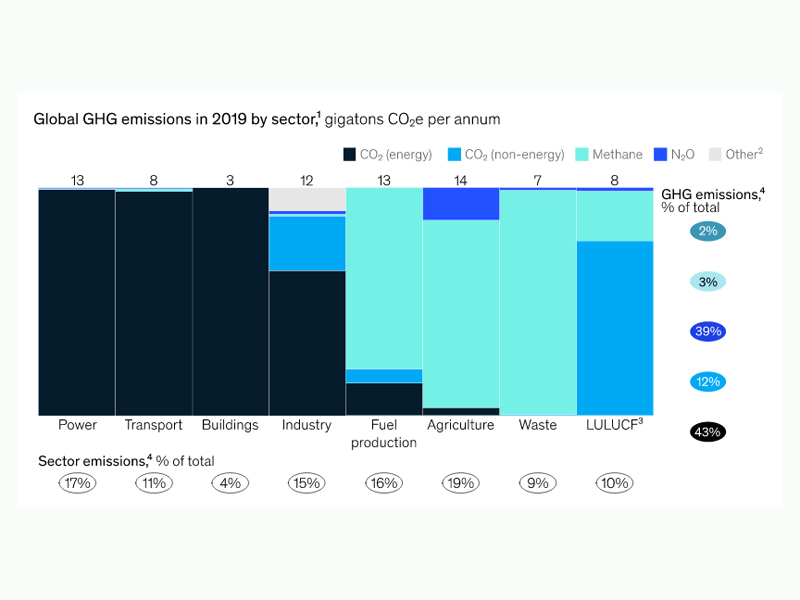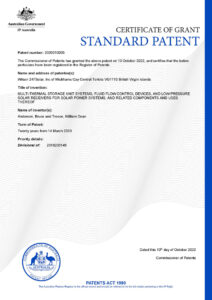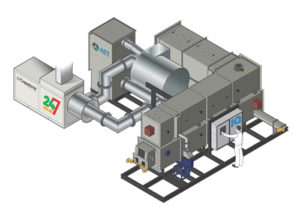THE 1.5 DEGREE TARGET IS SLIPPING AWAY
It’s more than CO2
The oft-cited target of limiting global warming to 1.5 degrees Celsius is slipping out of reach, according to The Economist and global consultancy McKinsey & Company. Instead, global greenhouse gas (GHG) emissions are on pace to raise global temperatures by between 1.7 °C and 2.4 °C by 2100.
In part, this is because carbon dioxide (CO2) emissions in 2021 rebounded to historic trends alongside the global economic recovery. In a posting based on their Global Energy Perspective 2022 report, McKinsey says that “while many expected COVID-19 to cause a more structural change that could contribute to lower emissions levels, global CO2 emissions are now back to pre-COVID-19 levels.”
Partial progress
According to McKinsey, a total of 68 countries, accounting for around 88 percent of global CO2 emissions, “have announced, pledged, or adopted climate plans to reduce emissions in the coming decades.” In line with governmental commitments, around 2,000 multinational companies have established targets to curb their carbon footprints, and there is significant public support for addressing climate change in most parts of the world. As a result, “global fossil-fuel consumption is projected to peak in the next decade as renewable electricity and hydrogen replace coal, oil and gas.”
Other obstacles

Source: McKinsey & Company
But it is not just the energy sector and CO2 emissions that contribute to the problem. Says McKinsey, “In addition to energy-related CO2 emissions, other greenhouse gases need to be abated to achieve climate targets.” GHG emissions beyond CO2, such as methane and nitrous oxide from fuel production, agriculture and waste disposal account for more than 40% of total GHG emissions and are expected to decline at a slower pace than CO2. Methane, in particular, contributes the greatest share of non-CO2 emissions, and given methane’s significant warming impact, McKinsey estimates “methane emissions need to be reduced by 34 percent by 2030 for global warming to achieve the 1.5 degree [target].”
McKinsey concludes that even as reaching a 1.5 degree target is becoming increasingly infeasible, the next decade of the energy transition will be crucial. “The physical and societal impact of global warming increases with every additional 0.1°C. Moreover, delaying the warming trajectory is crucial to give communities more time to adapt.”
Read more from McKinsey here.
DID YOU KNOW?
247Solar’s Heat2Power Turbine with solid waster gasifier and thermal oxidizer
247Solar’s Heat2Power™ turbine is the key component in a new system for eliminating methane leaks from landfills by repurposing solid waste into carbon-free electricity and useful products. Energy from this new source will provide a new revenue stream for landfill owners. Enhanced repurposing will extend the operational lives of the landfills and allow landfill sites to develop a more sustainable operating model. The first commercial-scale system of this type will be built Victoria, Australia, in 2023. Learn more
COP27 BOOSTS GREEN HYDROGEN
Much that came out of the recently completed COP27 gathering in Sharm El Sheikh, Egypt, was inconclusive. But according to Jonas Moberg, CEO of the Green Hydrogen Organization, “Green hydrogen is one of the bright spots of this COP.” In a video interview for Energy Monitor, Moberg says “Green, or renewable, hydrogen could displace carbon-based fuels in everything from fertilisers to steel-making to fuel for ships.”
Fredrik Mowill, CEO and co-founder of Norwegian hydrogen company Hystar, makes a similar point in an article on COP27 for PV Magazine, asserting that hydrogen “has a critical role to play in transitioning our heaviest-polluting and most power-intensive industries.” For example, he notes that “the iron and steel industry alone is responsible for 11% of global CO2 emissions … and relies on coal furnaces at more than 60% of steelmaking sites.” Alternatives such as electric arc furnaces can use recycled metals combined with hydrogen to dramatically reduce emissions.
For hydrogen to be called green, its production must be powered by renewable sources using a process, like electrolysis, that produces zero emissions. The challenge is that producing large amounts of hydrogen in this way requires expensive equipment that must operate 24/7 to be economical. Heat above 500 °C increases electrolyzer efficiency by up to 40%. The unique design of 247Solar Plants™ unique design produces combined heat and power (CHP), making them a low-cost 24/7 source of clean electricity and heat for producing abundant, economical, truly green hydrogen. Read more here.
WAR AND VANDALISM REVEAL THE SHORTCOMINGS OF GRIDS

TU Studio/Shutterstock
“2022 was a bad year for electric grids.” So begins an editorial in Microgrid Knowledge, prompted by the recent incident in North Carolina where vandals shot into, and disabled, substations owned by Duke Energy with mere firearms, causing 45,000 customers to lose power. And of course, there’s Russia’s bombardment of Ukraine, which shows “what happens to a 21st-century society when the electric grid becomes a war target.” The article goes on to list numerous other calamities that befell centralized grids in 2022.
Microgrid Knowledge is a superb resource for information about microgrids that increase power system reliability and resilience by distributing power generation and locating it close to the customer. To learn more about Microgrid Knowledge, click here.
To learn more about 247Solar’s microgrid solutions, click here.
NEWS FROM 247SOLAR
247Solar granted Australia patent on core technology
 The atmospheric-pressure solar receiver, thermal storage, flow-control devices and other related components behind our 247Solar Plants and HeatStorE™ long-duration thermal battery are now patent-protected in Australia, in addition to the United States and other key markets around the world. The Australian patent, issued on 13 October, joins more than 30 other patents that broadly & completely protect the entire field of “low-pressure-air solar power towers” in all major global markets. Read our press release.
The atmospheric-pressure solar receiver, thermal storage, flow-control devices and other related components behind our 247Solar Plants and HeatStorE™ long-duration thermal battery are now patent-protected in Australia, in addition to the United States and other key markets around the world. The Australian patent, issued on 13 October, joins more than 30 other patents that broadly & completely protect the entire field of “low-pressure-air solar power towers” in all major global markets. Read our press release.
FOLLOW & JOIN 247Solar
LinkedIn US, LinkedinEU, Twitter, YouTube
Contact: info@247solar.com
